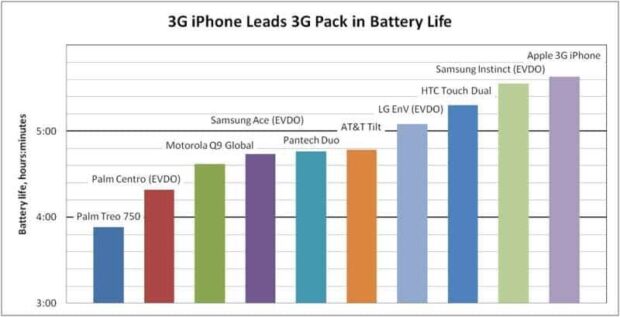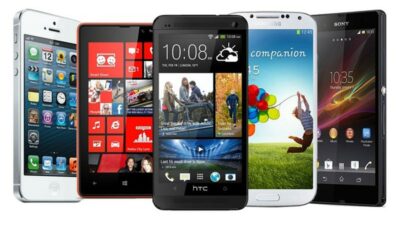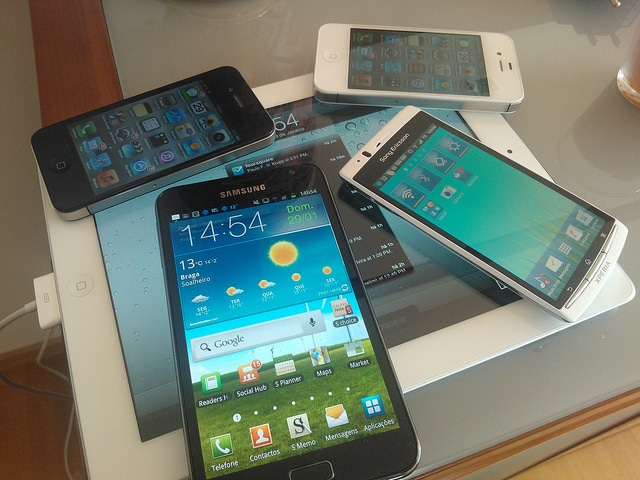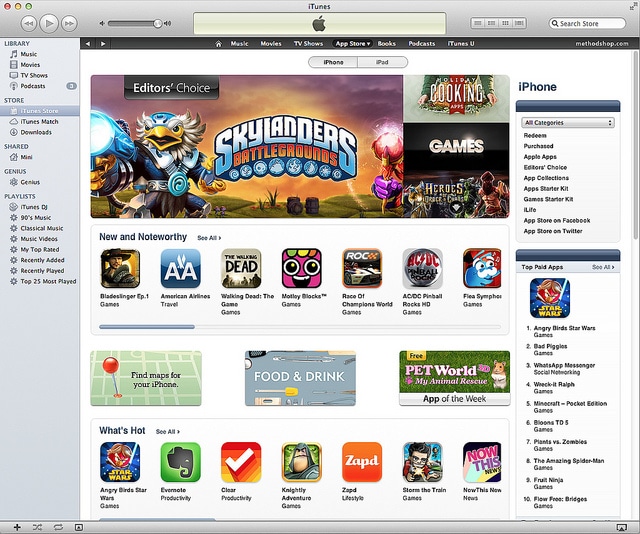Table of Contents[Hide][Show]
- 01) Size
- 02) How Easy Does Your Smartphone Break?
- 03) Memory
- 04) Which Wireless Carrier/Plan Do You Have? Can You Switch?
- 05) What Apps Are Available?
- 06) What Accessories Are Available?
- 07) What Do Consumer Watchdogs Say about your Smartphone?
- 08) What is the Warranty on Your Smartphone?
- 09) What is the Resale Value on Your Smartphone?
- 10) What is the Battery Life Like?
- Final Thoughts
Buying a new smartphone can really be a confusing process. There are so many new options to chose from. New companies. New phones. New operating systems. New apps. So what should you buy? Android? iPhone? Windows Phone? Blackberry?!
Let’s review the most important things that should be part of your consideration process before buying a new smartphone.
01) Size
You might not originally think about the size of your new phone. There are two plays in today’s market – smaller and bigger.
Let’s start with bigger. Do you want more screen and really don’t want to put a phone to your ear? The phone is Bluetooth connected to an earpiece, so you can use the phone like a tablet. This would be perfect for a planner. They can look at the screen and set up an appointment for you. Maybe you own a small retail shop – you could easily take an order and enter their information wherever you are.
The Samsung Galaxy Note (pictured above) would be a Smartphone to look at. It even comes with a stylus if you don’t like to touch the screen too much.
02) How Easy Does Your Smartphone Break?
There are a lot of video companies out there creating shows where all the people do is try and break the smartphone, tablet, gaming device or other mobile electronics. They will
drop it from different angles and heights. Just like if you were to pull it out of your pocket and lose control of the phone. Front face, the rear face and side drops will show you what happens to the phone without a protective case.
The iPhone 5 has a new type of “super glass” called Gorilla Glass 2 that is very strong and crack resistant. Will it ding the edge or full out destroy the front glass?
03) Memory
Right now, 16 or 32 GB of storage is common. 32 GB can hold a good number of apps, photos, music, movies and more. Expect that to increase dramatically over the years as people rely more on their phones. Cloud storage will also alleviate the memory needed on your smartphone however you will need space for games, task libraries and stuff you need at your fingertips.
Stay away from smartphones with under 16 GB of memory. You will be running into too many roadblocks if trying to install a new app or downloading the latest songs from Adele, Maroon 5 or Taylor Swift.

04) Which Wireless Carrier/Plan Do You Have? Can You Switch?
There are phones that are exclusive to a certain carrier. Of course, we have the added issues of GSM vs CDMA. If you shell out $200 for a phone, you want to make sure it allows you to jump to another carrier. Better yet – if you are traveling cross-continent, you might want a phone that will work over the pond with an international SIM card.
The iPhone was specific to AT&T in the US; since then has been added to other carriers like Verizon and Sprint.
05) What Apps Are Available?
A smartphone without apps is like a circus without acts. Simple as that. If your smartphone cannot get to Facebook, Twitter, Angry Birds, email, or a vast array of other popular programs and games, then why have it?
With 4 times the developers, Apple seems to be winning the app development over Android. However, Apple’s app store is pretty stringent. If you want an app that shows questionable content (for example, porn), Apple might not be the way to go.
The biggest cost associated with your smartphone might be the applications. Some apps are free, but “in-app” purchases can cost hundreds. I am playing a game on my iPad right now where I could buy a chest of gems for $99.99. The app was free and my desire to build my land might sway me to make the purchase. All because that initial app was free.
06) What Accessories Are Available?
There are plenty of accessories that can enhance your smartphone including adapters that turn your phone into a game console, remote controls, DJ mixers and many more.
07) What Do Consumer Watchdogs Say about your Smartphone?
It’s always a great idea to look at sites like Consumer Reports. Find out what they’re saying about the smartphone. If the phone hasn’t come out yet then find out where the fanboys are and quiz them for ideas.
A lot of smartphones have previous models. Get info on how they performed. If the screen looked dark and the company doesn’t address it, you might find the screen will continue to plague the phone.
Once again – there are a lot of review videos out there that get into the nitty-gritty. A company like iFixit takes apart the smartphone and shows you the internal parts. While that might not tell you if the phone works in that valley town you live in where reception is spotty at best – it’s cool to see the thing in pieces.
08) What is the Warranty on Your Smartphone?
If you drop the phone, will it get replaced? What if the battery explodes or you drop it in water?
Check out the warranty on the phone. Some smartphones even have an extended warranty. If you purchased your smartphone with a 2-year contract, you got the phone at a substantial discount. If the phone is damaged, it may cost up to $700 to replace.
If you drop your devices a lot and don’t want to get a case, you might want to put insurance on your smartphone. Companies like Worth Avenue Group will help insure your smartphone. If the screen cracks – they’ll fix it. Drop it in water – they will fix it. All for only a couple bucks a month.
09) What is the Resale Value on Your Smartphone?
This is a pretty interesting question. A lot of smartphones still retain good value if in decent condition. For example, my iPhone 3GS is still worth $40 on Gazelle.com. The Nokia Lumina 900 is $95 and an iPhone 4s will get you $400. Not too bad.
10) What is the Battery Life Like?
This is the most important question and the biggest problem I have with Android phones. Someone will use their smartphone – install an app or watch TV on it – and within hours the phone is dead. I’ve even seen phones lose power just sitting on a table.

When you’re not using the phone, the apps might be. They might be sending you “push notifications” or updating data. Those background checks can drain the battery of your phone faster than you can dial 911. My girlfriend has a phone like that. Good thing I have extra charge cables. I can go two days without having to charge, but her phone just sucks the life out of the battery.
I also have a couple battery chargers I take with me. The ZAGG Sparq, for example, allows me to charge my phone when no outlets are present. I even have a power charger that uses solar power. Oh yes – I use that.
Final Thoughts
These are some simple questions to ask when looking for a smartphone. It really depends on how the consumer will be using the phone. Watch the data plans and plan a budget around your purchases. Make sure you have 2-3 cables so you can charge your phone in the car, at home, and at the office. Most important – get the phone that will work with you the best. After all – a smartphone without the tools you need is not really that smart…
Photos via paulosvfernandes & tijsvrolix
As a podcaster, videographer and blogger, Jeffrey works to convey the geek message. Inspired and passionate about tech and geek life. As a musician, Jeffrey loves to rock the house.













 How To Learn The Definition Of LOL… The Hard Way
How To Learn The Definition Of LOL… The Hard Way
Leave a Reply
You must be logged in to post a comment.